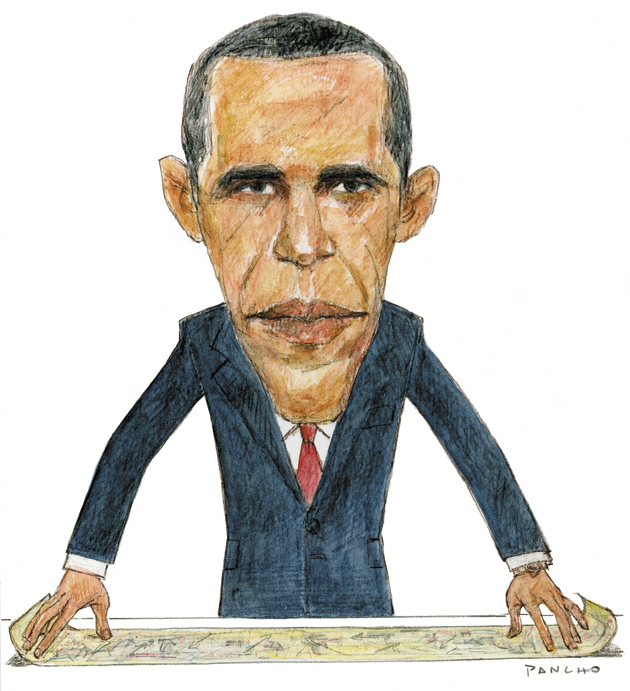Lately, Barack Obama doesn’t look like such a bad poker player. Roundly criticized for “negotiating with himself” before the Republicans even got to the table on the tax compromise—and for the Democrats’ abysmal showing in the midterm elections—the president can now claim a head-turning sequence of out-of-nowhere legislative victories: the long-sought repeal of the “don’t ask, don’t tell” law, the approval of the New Start treaty with Russia, and, on Wednesday afternoon, a bill extending health coverage benefits for rescue workers and others who got sick in the 9/11 aftermath. Republicans had invested much time and energy in blocking all of them, and very few Democrats in Washington would have been willing to predict two weeks ago that any of these measures would pass.
More credit, in truth, may be owed to Harry Reid and Nancy Pelosi than to Obama directly. When the repeal of don’t ask, don’t tell failed in the Senate as an attachment to a defense appropriation in September, Pelosi forced a vote on a stand-alone repeal in the House; the surprising margin in favor of getting rid of the law (250–175) surely put some psychological pressure on the Senate. And Joe Lieberman, an independent, worked that issue harder than any other senator. On the arms control treaty, the White House appeared to have been more directly involved, with the president making last minute calls to senators and approval of the New Start treaty framed by the White House as part of Obama’s acceptance of the tax compromise extending the Bush tax cuts for the upper brackets. But it, too, depended on the work of senators—in this case people like Indiana Republican Richard Lugar, who persuaded several of his GOP colleagues to hop aboard, directly defying Republican Senate leader Mitch McConnell, who had announced his personal opposition to the treaty Sunday.
The whole process, in which senators facing time pressure to get things done finally got down to the business of doing them, made a mockery of the way that institution normally operates. Arizona Republican Jon Kyl more or less singlehandedly kept the Start treaty from a vote for months; his colleague John McCain, followed by a few other Republicans, did the same on don’t ask, don’t tell. But with the congressional session ending, both of these allegedly controversial measures passed with reasonably comfortable super-majorities. All the so-called principled opposition was just a small handful of people gumming up the works. And the 9/11 first responders’ bill, which languished for months or even years, was resolved swiftly through old-fashioned compromise on costs. (It provides $4.3 billion over five years, instead of $7.4 billion of eight years as originally proposed.)
However, we should not think that Republicans and Democrats alike have now discovered the joys of bipartisanship and will transfer these happy habits to the next Congress, which will convene on January 5. Matters will, alas, revert to normal. At best. A huge fight over the budget and spending awaits the next Congress. This week, the Senate passed (and the House was expected to pass) a “continuing resolution” to keeping funding the operations of the federal government at current levels through March. And that is when the guns will be drawn. The Republicans will push for deep spending cuts, especially to social programs and entitlements; Democrats will push for as many cuts to defense spending as they can. There will be a vote on raising the debt ceiling—the threshold set by Congress beyond which the government is forbidden from borrowing money—around then as well. This vote will give Republicans leverage—no sitting president can afford a failed vote on that, because of the potential economic consequences for the global economy—wreaking havoc, for instance. No one would ever have thought before that Congress would refuse to raise the debt ceiling, but the nature of the incoming, tea-party-inflected GOP legislative membership is such that the possibility now has to be taken at least semi-seriously.
Eyes will be on Obama as the new year begins. What kinds of cuts will he offer first, in an effort to take control of the debate? What will he say on Social Security? How far will he go toward accepting the premise of the Washington establishment that deficits and spending must be reined in above all else? Liberals fear a sell-out. Scuttlebutt has already begun on what we will and will not hear in the upcoming State of the Union address, which will certainly be Obama’s most important and might arguably be the most important such address since George W. Bush’s 2002 “axis of evil” speech. The hope among Democrats will be for Obama to lay out his agenda, try to shape the coming debate with Republicans, and draw a few lines in the sand. He cannot count on a continuation of this fortnight’s burst of bipartisanship, but the recent victories have probably replenished his capital with his own party, and to some extent with independent voters, putting him in a stronger position as he prepares for battle.
Advertisement



